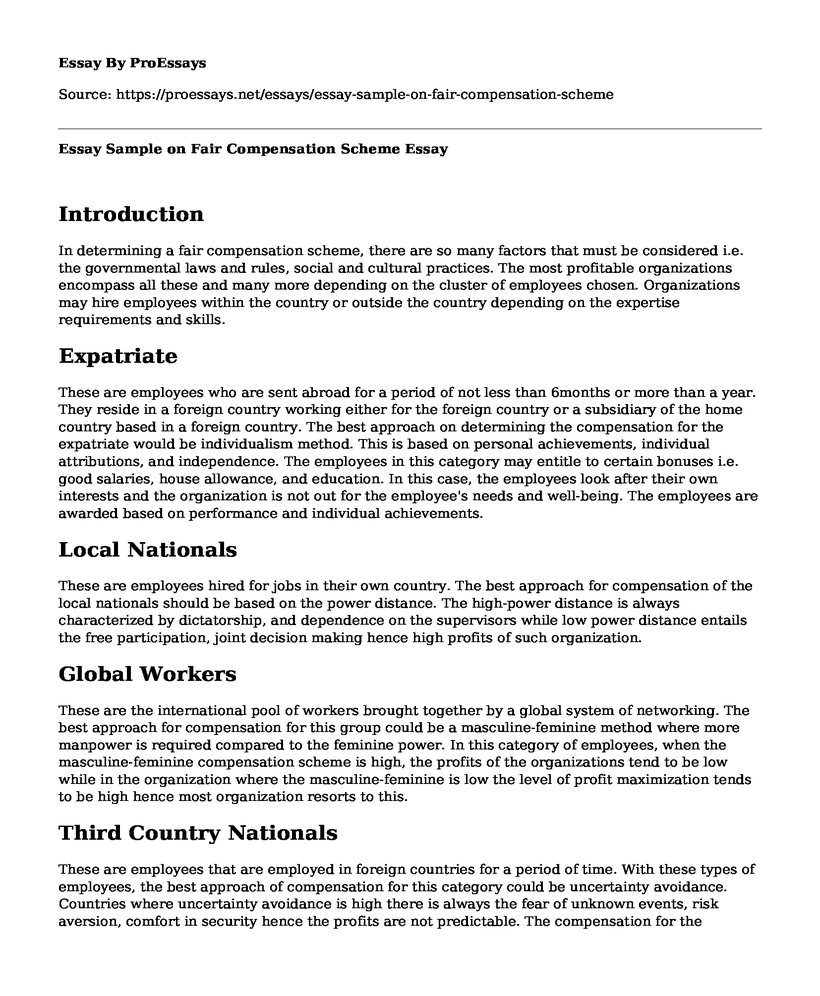Introduction
In determining a fair compensation scheme, there are so many factors that must be considered i.e. the governmental laws and rules, social and cultural practices. The most profitable organizations encompass all these and many more depending on the cluster of employees chosen. Organizations may hire employees within the country or outside the country depending on the expertise requirements and skills.
Expatriate
These are employees who are sent abroad for a period of not less than 6months or more than a year. They reside in a foreign country working either for the foreign country or a subsidiary of the home country based in a foreign country. The best approach on determining the compensation for the expatriate would be individualism method. This is based on personal achievements, individual attributions, and independence. The employees in this category may entitle to certain bonuses i.e. good salaries, house allowance, and education. In this case, the employees look after their own interests and the organization is not out for the employee's needs and well-being. The employees are awarded based on performance and individual achievements.
Local Nationals
These are employees hired for jobs in their own country. The best approach for compensation of the local nationals should be based on the power distance. The high-power distance is always characterized by dictatorship, and dependence on the supervisors while low power distance entails the free participation, joint decision making hence high profits of such organization.
Global Workers
These are the international pool of workers brought together by a global system of networking. The best approach for compensation for this group could be a masculine-feminine method where more manpower is required compared to the feminine power. In this category of employees, when the masculine-feminine compensation scheme is high, the profits of the organizations tend to be low while in the organization where the masculine-feminine is low the level of profit maximization tends to be high hence most organization resorts to this.
Third Country Nationals
These are employees that are employed in foreign countries for a period of time. With these types of employees, the best approach of compensation for this category could be uncertainty avoidance. Countries where uncertainty avoidance is high there is always the fear of unknown events, risk aversion, comfort in security hence the profits are not predictable. The compensation for the employees in these sectors tends to be fixed. In countries where uncertainty avoidance is high, profits are high due to the risk-taking natures of the organizations, high levels of innovation. These are characterized with variable pay i.e. when the profits are high the compensation level increases depending on the level of seniority. Generally, the best compensation approach should be that which has both the social, cultural aspects put into consideration.
References
Mahoney, T.A "Employment Compensation Planning and Strategy" In L.R Gomez
Cite this page
Essay Sample on Fair Compensation Scheme. (2022, Nov 27). Retrieved from https://proessays.net/essays/essay-sample-on-fair-compensation-scheme
If you are the original author of this essay and no longer wish to have it published on the ProEssays website, please click below to request its removal:
- Research Paper on Multivariate Garch Models
- Impacts of Globalization and Technology on the Performance of Dunkin Donutsre
- Harassment of Yang in AN Leads to Job Loss - Essay Sample
- Conflict Resolution Between Employees & Employers: Unions vs. Arbitration - Case Study
- Essay Example on Gig Economy: New Way of Working for the 21st Century.
- Paper Sample on Peru Economy in 2020: GDP Declines
- Unlock HR Info with Self-Service Portals: Streamline Access for Staff & Applicants







